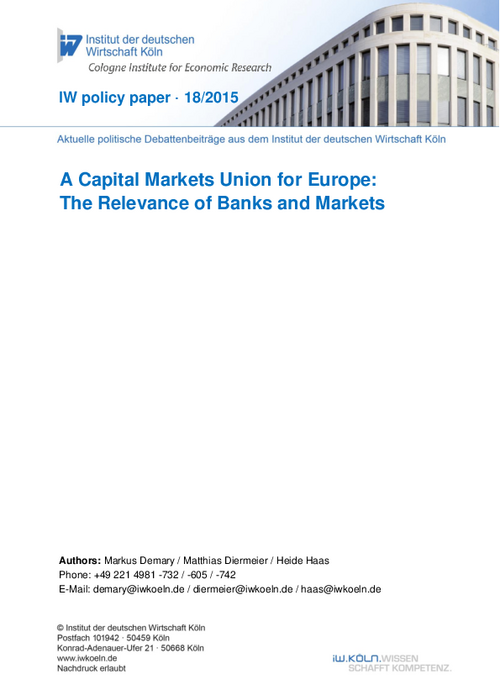The establishment of a Capital Markets Union (CMU) is a high-priority project of the European Commission. CMU should foster additional non-bank sources of finance, mobilize private savings more efficiently and enhance capital market integration.

A Capital Markets Union for Europe: The Relevance of Banks and Markets

The establishment of a Capital Markets Union (CMU) is a high-priority project of the European Commission. CMU should foster additional non-bank sources of finance, mobilize private savings more efficiently and enhance capital market integration.
Although more integration is needed, the Commission‘s proposal misses the role of systemic functions in a CMU. First, banks are important intermediaries specialized in credit relationships and small and medium-sized companies gain from long-term relationships with banks. Second, overcoming financial fragmentation needs sound sovereign debt markets with stable sovereign finances. In a CMU sovereign risks have to be treated adequately in bank regulation. Third, it should be assessed in advance which sources of non-bank finance will be demanded by companies and will become systemic. We recommend an integrated financial supervision for the CMU. Therefore, the European Banking Union should cover all European Union members’ systemic relevant banks. In order to mobilize private savings while coping with the CMU’s complexity, the EU should foster financial literacy.

A Capital Markets Union for Europe: The Relevance of Banks and Markets


33. Finanzmarkt Round-Table: De-Industrialisierung – Gefahr für den Finanz- und Wirtschaftsstandort Deutschland?
Das Institut der deutschen Wirtschaft, die DekaBank und die Börsen-Zeitung laden Sie zum Finanzmarkt Round-Table am Montag, den 29. April 2024 von 10:30 bis 12:30 Uhr ein. Der Round-Table findet als Online-Veranstaltung statt.
IW
Deindustrialisierung: Aktuelle Entwicklungen von Direktinvestitionen
Obwohl sich die Situation bei den Energiekosten nach den Turbulenzen der letzten Jahre wieder etwas entspannt hat, sehen wir weiterhin hohe (Netto-)Abflüsse von Direktinvestitionen aus Deutschland. Das deutet darauf hin, dass die Perspektiven am Standort ...
IW